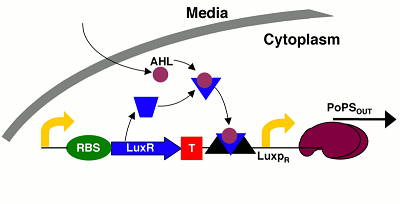Lux signaling system
From 2008.igem.org
(→Lux cell signaling system) |
|||
| Line 1: | Line 1: | ||
| + | {| style="color:#1b2c8a;background-color:#0c6;" cellpadding="3" cellspacing="1" border="1" bordercolor="#fff" width="62%" align="center" | ||
| + | !align="center"|[[Team:Davidson-Missouri_Western|Home]] | ||
| + | !align="center"|[[Team:Davidson-Missouri_Western/Team|The Team]] | ||
| + | !align="center"|[[Team:Davidson-Missouri_Western/Project|''E. nigma'' Project]] | ||
| + | !align="center"|[[Team:Davidson-Missouri_Western/New_Parts_Contributed_to_the_Registry|Parts Submitted to the Registry]] | ||
| + | !align="center"|[[Team:Davidson-Missouri_Western/Notebook|Notebook]] | ||
| + | |} | ||
| + | <br> | ||
| + | |||
== Lux cell signaling system == | == Lux cell signaling system == | ||
Latest revision as of 03:51, 30 October 2008
| Home | The Team | E. nigma Project | Parts Submitted to the Registry | Notebook |
|---|
Lux cell signaling system
Signal molecule: N-acyl-homoserine lactone (AHL) Generic term for a variety of species specific hormone-like molecules. The molecule of focus: 3-oxohexanoyl-homoserine lactone.
Bacterial species: discovered in Vibrio fischeri known to work in E. coli
Receiver protein: LuxR protein receives signal from AHL; also has some control over transciption of luciferase
Signal molecule synthase: LuxI; also has some control over transciption of luciferase
Additional Information: "Quorum Quenching" aiiA (intracellular) lactonase reduces AHL concentration
Resources
[http://partsregistry.org/Lux Lux Operon Pathway]
[http://partsregistry.org/AHL AHL signaling molecules by species; some are specific to gram pos but may affect gram negs]
[http://www.horizonpress.com/jmmb/v1/v1n1/03.pdf Reducing Crosstalk in Lux System]
References
[http://www.pubmedcentral.nih.gov/articlerender.fcgi?artid=522112 Quorum Quenching to control Lux Pathway]
[http://www.nature.com/nature/journal/v434/n7037/full/nature03461.html] A Synthetic multicellular system for programmed pattern formation
 "
"
